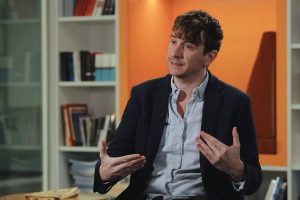The Structure of Expert Knowledge
Sociologist Viktor Vakhshtayn on competition between scientists and experts, the survivorship bias, and the me...
There’s a great article by an American anthropologist who was doing research in Peru in the 1980s. You may know that Peru was a place, in which there was a radical revolutionary upheaval with Maoist movements, associated with a famous movement of in Sendero Luminoso, The Shining Path. This anthropologist was extremely frustrated with his fellow anthropologists, who spent time in Peru at the time, and all this upheaval was happening, and none of them seemed to write about it. People were writing about traditional Peruvian rituals or cosmology, or all sorts of local beliefs and practices, and this political movement was happening just at their doorstep and they wouldn’t write about it. So, this anthropologists wrote a famous article that said: “How come anthropologists miss revolutions when they happen at their door?” This is actually true in the history of anthropology.
If you think about it, anthropologists are traditionally the people who go to all sorts of different parts of the world to study topics such as ritual or kinship, or indigenous forms of social organization and so on. This is a discipline that developed in the 20th century and a lot of it happened at a time of post-colonial reactions to colonial governments. A lot of those were associated with revolutionary movements. You could say the same about Peru, for example. But anthropologists somehow tended to miss this. Often you find references in anthropologists’ studies of countries in Africa or Asia, or Latin America and so on. They refer to political events happening around them, but they place more in context rather than in the focus of their studies.
At the same time, political scientists, sociologists, historians, of course, have written enormous amounts about revolution. You might want to say that the revolution as a kind of form of political action is the myth of modernity, it’s the beginning of the modern world. If you think of the importance of the French Revolution, for example, in the way that we think. So, what my project is as it were is to develop an anthropological approach to revolutionary politics.
It’s interesting that the author of this article about Peru that I mentioned recommends to anthropologists that they move closer to the kinds of topics that political scientists might look at. He recommends that, essentially, for anthropology of the modern world to work and to be able to deal with phenomena such as a revolution we have to take into account things like political economy.
In developing this project I’ve singled out – I mean, there are many ways one could go about this – three broad areas, which I think are really interesting in developing an anthropological understanding of what revolutions are. An understanding that in a way engages with people’s own conception of what they’re involved in when they’re involved in a revolutionary movement.
One way of thinking about revolutions, which I think is particularly interesting and where anthropologists can really bring some expertise into understanding them, is thinking of them as attempts to really generate a new kind of world.This is often what people say when they think about their project as revolutionaries. They’re saying: “Okay, we have to completely destroy the ancient regime – as people would call it in the French case – and bring about a completely new order of things. In Spanish language and, for example, in Cuba where I work, people would habitually talk about the revolution of 1959 as the attempt to bring about el mundo mejor, a better world. As an anthropologist when I look at that I think of it as a cosmogonic act. What kind of world is being brought about by people when they enact a revolution? How do they imagine the difference between the world that they leave behind and the world that they’re in the process of creating in this kind of radical, often violent upheaval?
Any anthropologist who is worth their salts as it were as an anthropologist knows that cosmogony, the beginning of the world, is something that each culture has a very big investment in. A very big concern of where we came from, and what is the shape of the world we live, and what is our position in it is a concern of every culture that we study as anthropologists. For example, if you think of Christian culture, the story of the Genesis is a cosmogonic story, how the world came about. Imagine if we thought about revolution as a cosmogonic act, then we could study the moment of its Genesis, if you like, of the Big Bang of the revolution that brought things about, but also the principles of transformation through time that allow a revolutionary society to get consolidated, to get institutionalized and so on.
To give you an example, where I work in Cuba, one of the first things that were said about the Cuban Revolution by Fidel Castro very soon after 1959, when he took power in Havana, was in a speech that he gave to intellectuals in Havana, who were worried at the time about their own position in this new political project. He said to them rather scarily, I think, in some ways that for them there was always space within the revolution, because the revolution is something that contains everything within it. Everything that exists can be contained within the revolution. The only thing that can’t be contained within the revolution account according to Fidel are the people who are explicitly against it. They have to be nullified, taken away out of the revolution.
This, of course, was a message that Fidel Castro was sending to the intellectuals at the time to do with intellectual freedom, freedom of expression and so on. But for me it’s also a kind of cosmological statement, it’s a statement about what kind of world the revolution is in Cuba. What for me is so interesting about this is that this concept of a revolution as an all-embracing totality that contains everything within it is something that is retained throughout the course of the Cuban Revolution as a process of development. I’d spend time in Cuba spend lots of time in Havana studying people’s understandings of what living in a revolutionary society might be. People talk about the revolution with the word “this thing”, and they point to this horizon around them, they say “this thing” around us right, they talk about how “this thing” around them suffocates them, how “this thing” around them has created them the way that they are, and how this thing around them is something that they cannot leave. There’s something that they’re contained within.
For me this is a way of thinking anthropologically about what the experience of living in a revolutionary society that is now well developed – I mean the Cuban Revolution has been going on for decades and decades – what this experience is like for the people who are within it, and to understand it in terms of its original cosmogonic moment, the Big Bang that created it, and then the cosmology, the universe that it created as a political project. That’s a very different way of talking about revolution when you compare it to the way that historians or political scientists or, indeed, political theorists and philosophers might talk about. What’s at stake for people went they do revolution.
A second point about how one might study revolution in a distinctively anthropological way and how it might one might be able to penetrate inside the way that the people think about it has to do with something very specific that, I think, revolutionary politics does to the extreme, which is the way that it connects what I was talking about before – this cosmological element of redesigning the political universe, the universe, in which people live via the projects of personal transformation.
Revolutionary politics par excellence is a kind of politics that says that in order to change the world, this cosmological transformation, you also have to change yourself. Revolutionary politics across the world since the French Revolution have been correlated always with projects of personal transformation. If you think of the idea people would classically talk about Stalinist Russia or the Soviet Union in terms of the birth of a kind of homo soveticus, this new kind of person, that the post-Lenin era of the Russian revolution was able to create, and what kind of person that was.
In Cuba Che Guevara talked about el hombre nuevo, which means the new man. The same kind of thing some people would say that is rather sexist because he would hope to have to be talking about the new woman, but that might say something about the machismo of the Cuban Revolution, I don’t know. But in one way or other, what is interesting to see in revolutionary politics is how these projects of a very concerted deliberate moral transformation of the population of the citizen are carried out.
One way to think of this project of personal transformation is to think of it as a form of asceticism. Asceticism is a word that we usually associate with religion, the ways, in which those religious devotees are called upon to transform their behavior, to transform themselves, to avoid, for example, sin in particular ways in order to change themselves and change their relationship with the divine, with God and so on. Thinking of revolution as a project of personal transformation allows us to create really interesting comparisons between personal transformation as a political project and personal transformation as a religious project.
This is particularly interesting if we’re thinking about revolutionary politics today. If you think about the most recent debates about revolution and its resurgence in the Arab Spring, in Tunisia, in Egypt, in Libya and all these parts of the world that have kind of revolutionary moments in the in the past few years, there’s been an intimate connection between revolutionary politics and Islamic faith. Looking at how those two things correlate with each other is a really powerful way, in which anthropologists can make a major contribution to understanding what revolutionary politics is about for the people who experience it.
What does revolutionary politics look like when you are for example the wife of one of the young men who were in Tahrir Square fighting with the police, worried about your husband, not being able to speak to him on the phone because there’s problems with communications, and worrying about the future of your child who’s sitting there in the kitchen with you while you’re cooking? This woman being treated from the point of view of classical political science approaches to revolution would appear more or less irrelevant to the events of the revolution. When you treat it from an anthropological point of view, trying to penetrate people’s experience of the revolutionary project, the experience of that woman can become just as important as the experience of her husband, who is Tahrir Square shouting and so on.
In a way an anthropological approach revolution also allows us to change the shape of the phenomenon that we’re looking at by moving the focus away from this action of violence that we usually associate with revolution – you know, the storming of the Bastille, the storming of the Winter Palace or Tahrir Square and so on – and looking at a much wider range of social transformations and concerns that are correlated with what is going on in these political projects of transformation.
In a sense, I think, if one had to sum up the importance of an anthropological approach to revolution it would be to say that anthropology is able to pluralize the ways that we think about what revolution might even be. Rather than having a kind of a priori understanding, an understanding from before you even have experienced it of what revolutionary politics is about, you penetrate the experience of people who are in different ways involved in it, and you ask the question what is revolution from their point of view, what is revolution from the point of view that other people that you’re studying. The answers that you might come up with here might be very varied. What counts as revolution, for example, in Cuba today might be very different from what counts from the point of view of the Muslim Brotherhood in Egypt today, which might in turn be very different from what counts as revolutionary politics from the point of view of Aymara people in Bolivia who are involved in the case of Evo Morales within the Process of Change, as they call it. As an anthropologist, you are able if you like to open up the concept of revolution and pluralize it in different ways and show how it is an issue for the very people who are involved in it.

Sociologist Viktor Vakhshtayn on competition between scientists and experts, the survivorship bias, and the me...

Media scientist Renira Rampazzo Gambarato on the freedom of speech online, netiquette, and the importance of m...

Historian Peter Jones on the first European universities, different models of the education regulation and the...